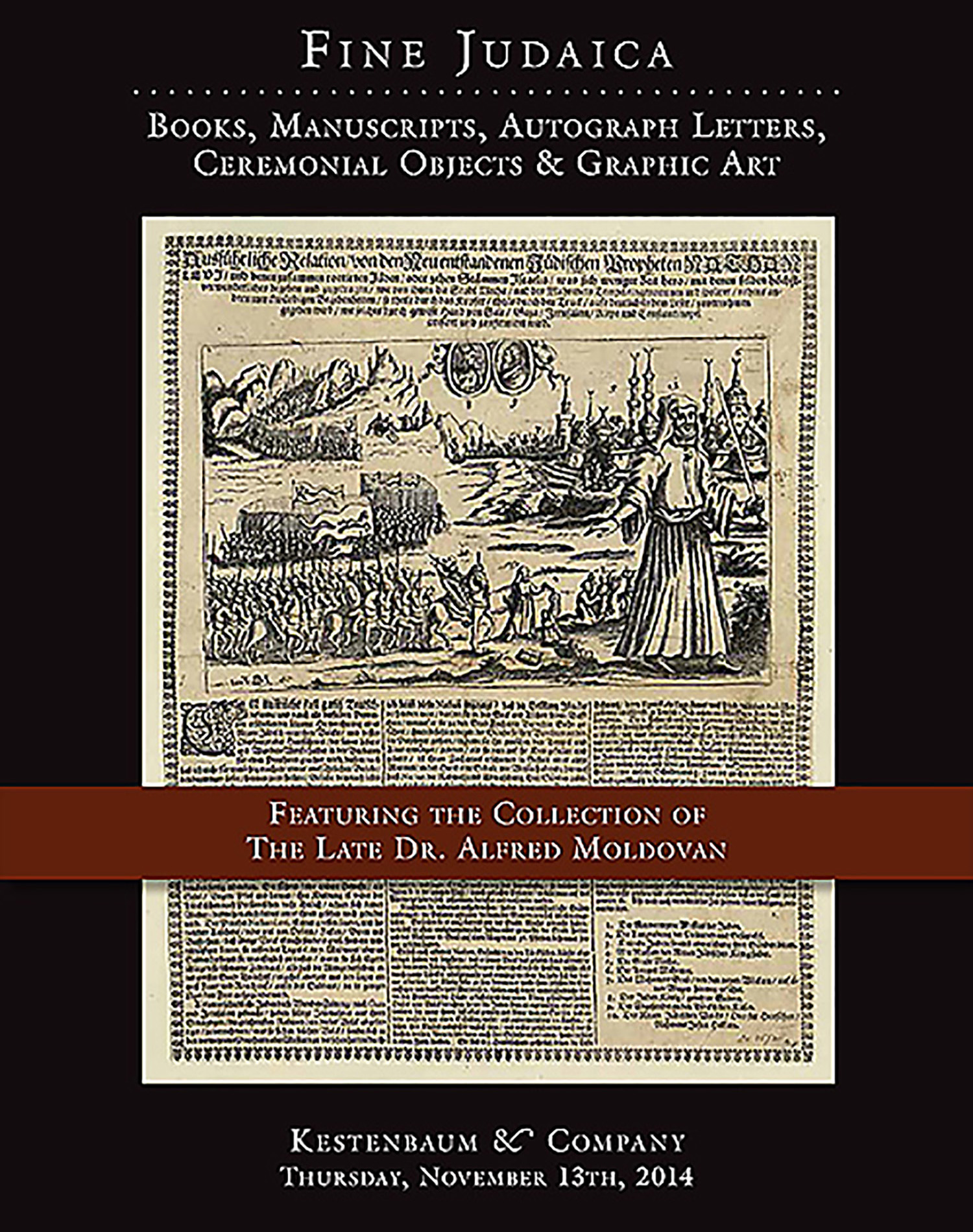Isaac N. Cardozo. A Discourse Delivered in Charleston (S.C) on the 21st of Nov. 1827, Before the Reformed Society of Israelites, for Promoting True Principles of Judaism According to its Purity and Spirit, on their Third Anniversary.

AUCTION 63 |
Thursday, November 13th,
2014 at 1:00
Fine Judaica: Books, Manuscripts, Autograph Letters, Graphic and Ceremonial Art
Lot 4
(AMERICAN JUDAICA).
Isaac N. Cardozo. A Discourse Delivered in Charleston (S.C) on the 21st of Nov. 1827, Before the Reformed Society of Israelites, for Promoting True Principles of Judaism According to its Purity and Spirit, on their Third Anniversary.
Charleston: James S. Burges 1827
Est: $10,000 - $15,000
PRICE REALIZED $80,000
The Reformed Society of Israelites for Promoting True Principles of Judaism According to Its Purity and Spirit was the name of the group that broke away in 1824 from Kahal Kadosh Beth Elohim (KKBE) of Charleston, South Carolina. They sought to make reforms to the traditional ritual, seeking to revitalize Jewish life with new prayers reflecting contemporary American life.
Led by Isaac Harby, Abraham Moise and David Nunes Carvalho the Reformed Society of Israelites reflected the fact that, as Jonathan Sarna has phrased it: “Jews who did not feel at home in synagogue no longer had to compromise their principles for the sake of consensus; they felt free to withdraw and start their own congregations. In free and democratic America, congregational autonomy became the rule, resulting in a new American Judaism - a Judaism of diversity and pluralism.”
The present rare pamphlet reflects the fact however that the halcyon days of the Reformed Society of Israelites, such as they were, did not last long. By the time the group celebrated its third anniversary meeting on November 21, 1827, they heard a much more sober evaluation of their prospects. Gone were the unalloyed enthusiasm and radiant optimism that typified the orations delivered at the first and second anniversary meetings. Now, Isaac N. Cardozo, the orator on this occasion, reminded his colleagues that “the reformer never had an easy row to hoe,” his path would always be “beset with a thousand obstacles.”
People were “wedded” to the religious forms and rituals to which they had been accustomed.” Religious prejudice,” Cardozo states here, was the “strongest and most incurable of human passions.” Reason cannot easily surmount the emotional comfort of doctrines that evoke “spiritual happiness and temporal welfare” within an individual. Attempting to reinforce their determination, he admonished society members not to anticipate unrealistic progress and not to expect complete success in all of their objectives. In what may well have been a tacit acceptance of the fact that there might soon come a time when dissension would need to give way to conciliation, Cardozo reminded his colleagues that “the intelligent reformer will, in his progress, always have sagacity enough to perceive how long to follow, and when to attempt to lead public opinion.”
Clearly, the group was by this time beset by numerous problems: Members of KKBE relentlessly criticized the dissenters. The members of the society lacked the solid grounding in Jewish tradition that would have enabled them to wage an effective defense. Intra-family relations were strained by the fact that many younger Jews belonged to the society while their parents remained loyal to KKBE.
After 1827 the Reformed Society of Israelites received very little public attention, and signs of the group’s impending dissolution began to appear. In 1828 Isaac Harby and David N. Carvalho, two of the group’s leaders, moved to New York and Baltimore, respectively. Unsuccessful in their ambition to raise funds to erect a new temple, the society’s leaders decided in 1833 to return (with interest) the money that had been collected for that purpose. By 1836 fourteen of the original forty-three signers of the society’s constitution had resigned and another nine had died. The group itself never officially disbanded, but it ceased to endure as a separate entity sometime after 1838.
Even after the Reformed Society of Israelites ceased to exist, the group’s clamor for liturgical reform continued to be heard. Failing to create an independent place of worship for themselves, many of the dissenters returned to KKBE and, ultimately, succeeded in realizing the society’s original goal: they managed to bring worship reform to the synagogue itself.
See G. Zola, Isaac Harby of Charleston, 1788-1828: Jewish Reformer and Intellectual (1994).
